The top 10 most valuable metrics for marketing managers

Published 2023-10-18
Summary - We know you don’t have time to read a never-ending article about the value of managing metrics for your marketing team's performance. We know this because you are leading a team of marketers whose roles are unique but also far reaching, so your position often feels like you’re a juggler in the circus.
We know you don’t have time to read a never-ending article about the value of managing metrics for your marketing team's performance. We know this because you are leading a team of marketers whose roles are unique but also far reaching, so your position often feels like you’re a juggler in the circus.
We also know this because in today’s data-driven economy you are probably already tracking various dimensions of performance on a long list of platforms designed for specific marketing practices. You use one platform because you want to track how your marketing efforts impact, say, lead generation, and another platform to drill down into the organic impressions for particular keywords you're tracking.
But consider this for a moment:
How much time do you spend connecting all those dots?
The problem you are likely facing is that when it’s time (and as a manager it’s always time) to either adapt or develop strategy, it feels like the heat is on trying to create a cohesive image of how all the moving pieces of your department fit together within the bigger picture.
Individually, the following metrics tell short stories of their own. As a marketing manager, though, you know that no team's efforts are complete without overarching departmental and company goals in mind. Those individual short stories must fuse into a novel. Taken together, these metrics will give you a purposeful glimpse into your team’s everyday consolidated performance, so you'll feel stable and ready when a fireball is thrown into your juggling routine.
The 10 marketing metrics every manager needs
- Return on Marketing Investment
- Incremental Sales
- Cost per Lead
- SEO Traffic
- Google Analytics Landing Page Performance for Optimization
- List Performance
- Social Traffic and Conversion
- Social Visits and Leads
- Web Traffic Targets (This Month)
- Traffic by Device
These metrics, to varying degrees, are critical to the success of most marketing teams wtih defined KPIs. But in addition to monitoring these metrics, you're likely managing multiple tasks and, depending on the size of your company, multiple teams of people. This is why I break down the 10 marketing metrics both in terms of what they are and in terms of which department or segment of your overall marketing team they may fall into.
The value of laying out your team's most important marketing metrics is that it allows you to share the responsibility of results, and it's difficult to obtain the desired results when there’s a lack of congruency and data transparency.
Also, while you're ahead of the game if you already have these metrics on a dashboard, for the sake of focus and team strategy we recommend splitting them into multiple dashboards—such as those for SEO, social media marketing, email marketing and web analytics.
Let's start with you, the marketing manager.
3 metrics for marketing managers to monitor
Return on Marketing Investment

This may be the most important metric that marketing managers need to track. ROI demonstrates how the department's time, energy and spend are contributing to company growth. This metric breaks down marketing ROI into campaigns and reveals what’s working and what’s not.
Many marketing ROI efforts focus on the ROI of particular campaigns. This is of course critical to optimizing campaign performance, but so too is it important to measure the true Return on Marketing Investment—and this demands taking stock of all marketing spend (including salaries) and comparing it across, for example, quarterly results.
Incremental Sales

Segueing from ROI, Incremental Sales asks a question fundamental to every company: Are marketing efforts increasing sales revenue? This metric communicates the success of your targeting strategy. High engagement but low Incremental Sales indicates a problem that must immediately be addressed. Reflectively reporting on this metric isn't enough; you need to monitor it so your team keeps on track for baseline sales.
Cost per Lead
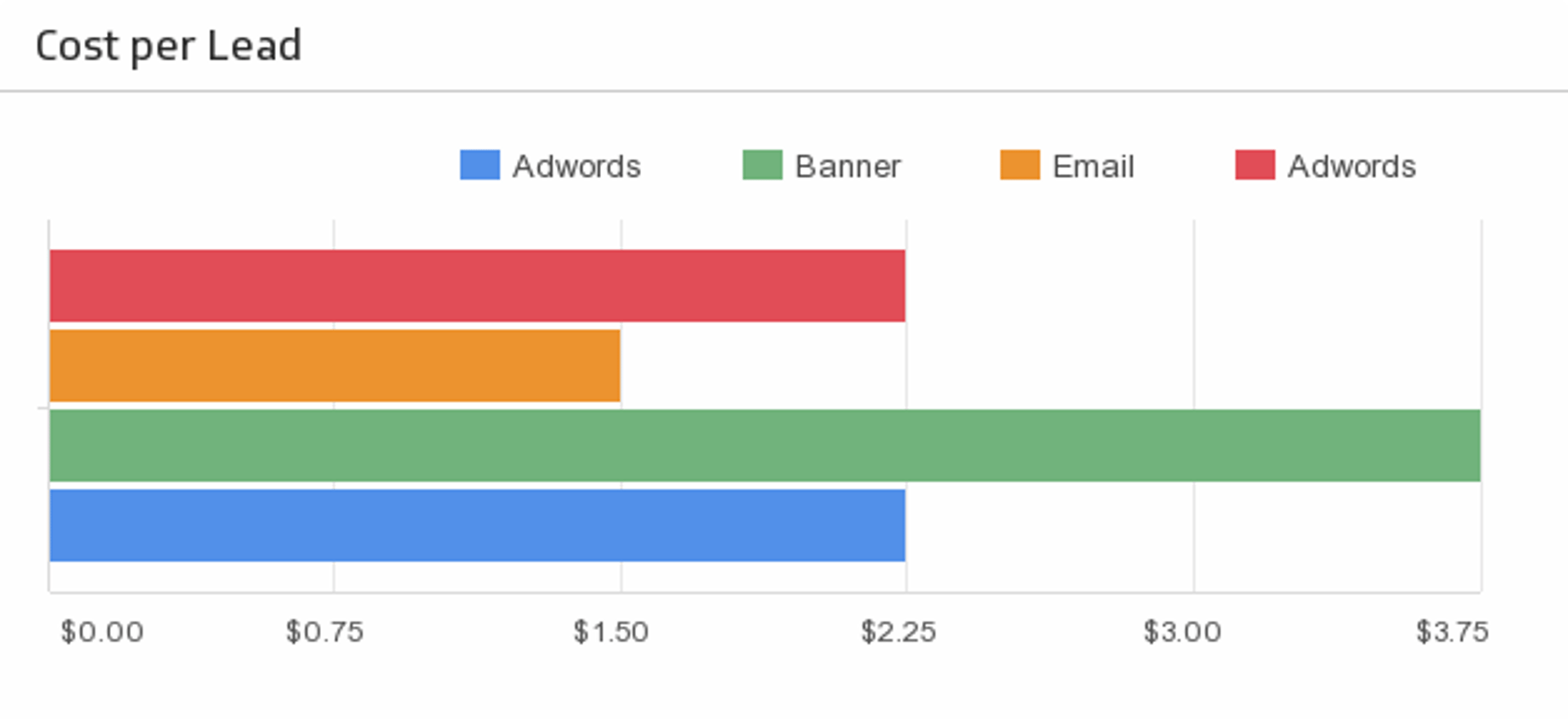
This metric gives managers monetary insight into the success of lead generation campaigns, and starts a conversation about what’s working and what’s not. It's crucial to track this metric alongside the other two, because lead quality and conversion rate are the backbone of what your team does and ultimately what it will be judged by.
I got a fever. And the only prescription is more... metrics!
Your company’s marketing strategy includes different campaigns on different platforms, executed by different people, all for the same purpose: generate leads and improve ROI. The following metrics are a few to keep at the top of your list when either optimizing or building out a diversified marketing strategy.
SEO
SEO Traffic
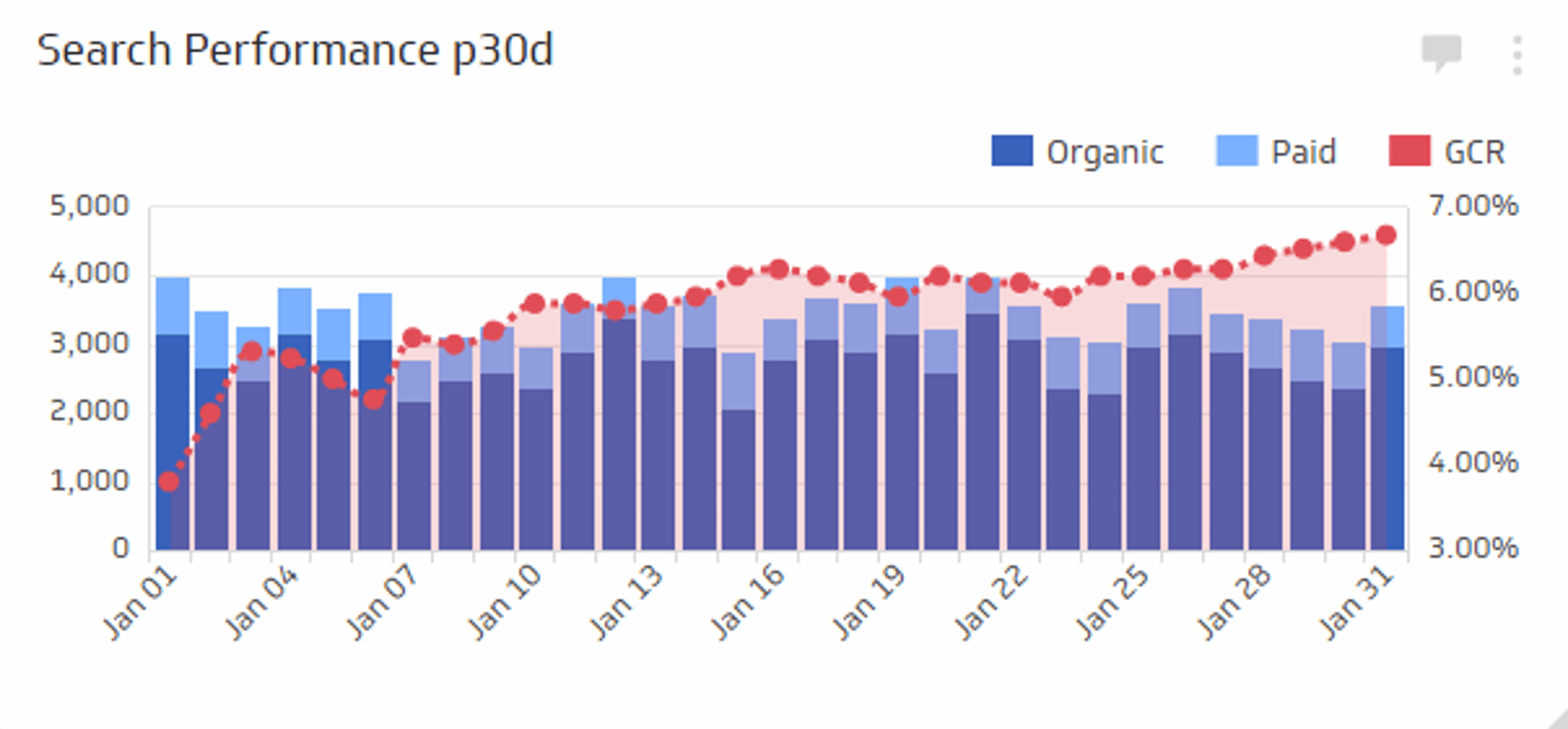
Paid vs. Organic. Knowing which works best for your company (or which presents an opportunity) is pivotal to managing your marketing strategy. You need to know the SEO traffic metric and know it in real-time because SEO as a practice is always changing; part of your role as a modern marketing manager is to remain ahead of the SEO curve for your team.
Google Analytics Landing Page Performance for Optimization
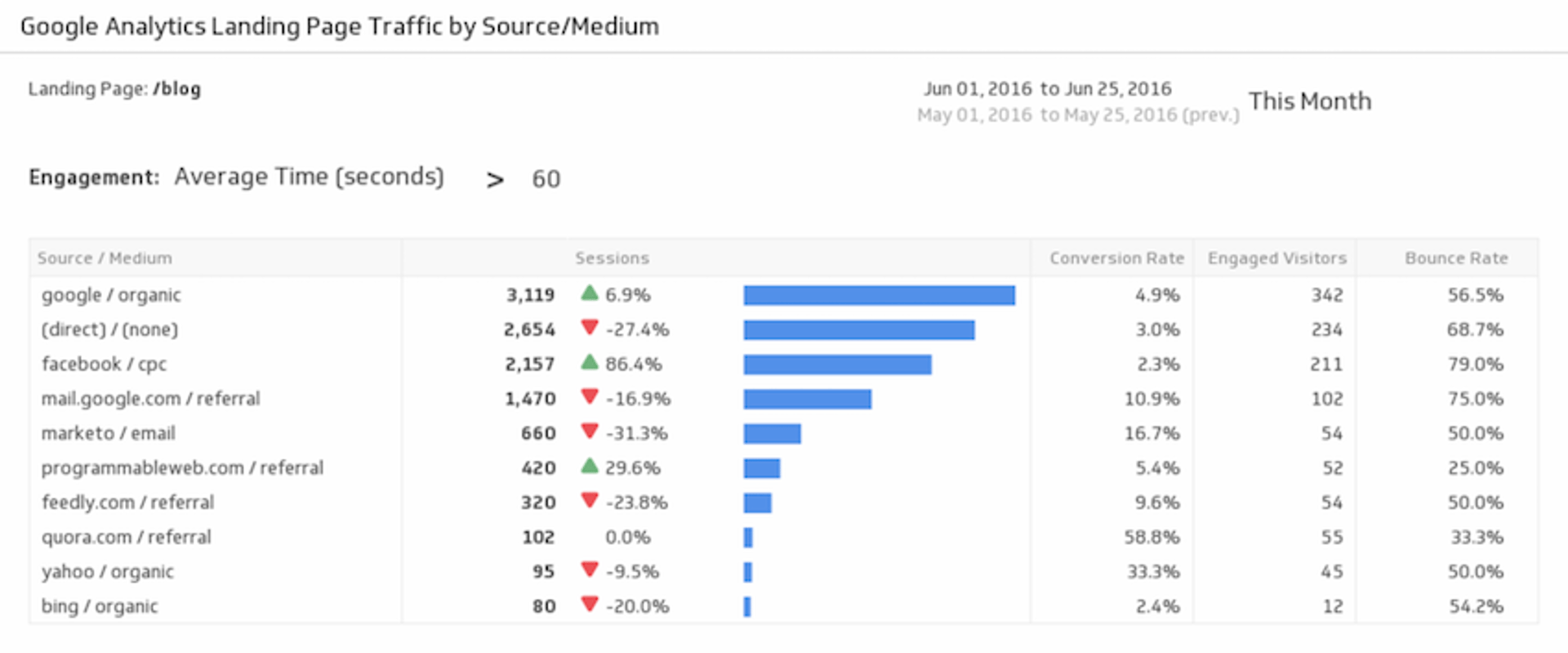
This metric helps marketing managers ensure that their target audience is (or is not) being directed to their landing pages. While parts of this metric may not show immediate results, it is essential to keep on a marketing manager's radar because it looks at performance over time. This includes sessions, conversion rate, engaged visitors and bounce rate, which are all components that can be continuously tweaked and improved upon.
Email Marketing
List Performance

As you may have many different email marketing campaigns on the go, this metric makes it easy to scroll through your email lists and see how your campaigns are performing. Manage performance data such as number of emails sent, opens, open rate, clicks and click rate. Make this comparative chart a starting point for productive conversations with your team.
Social Media Marketing
Social Traffic and Conversion
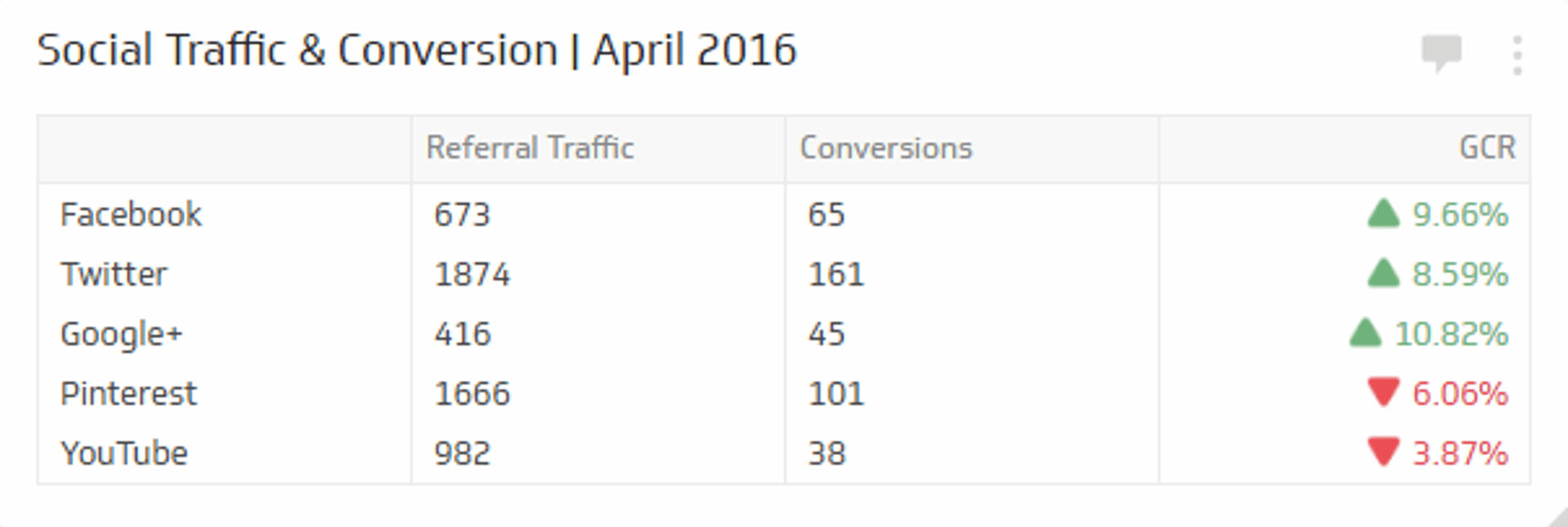
This social media marketing metric connects your team’s social media performance on different platforms to your goal conversion rate. Looking at this metric tells you which social media platforms are performing best for your team; you may be surprised once you dig in! Use this insight to inform your strategy, allocate budget and see if your marketing objectives are meeting intended goals.
Social Visits and Leads

This metric proves that social media marketing's impact is not as unclear as some might think. In fact, this metric directly demonstrates the ROI from your social media campaign.
Web Analytics
Web Traffic Targets (This Month)
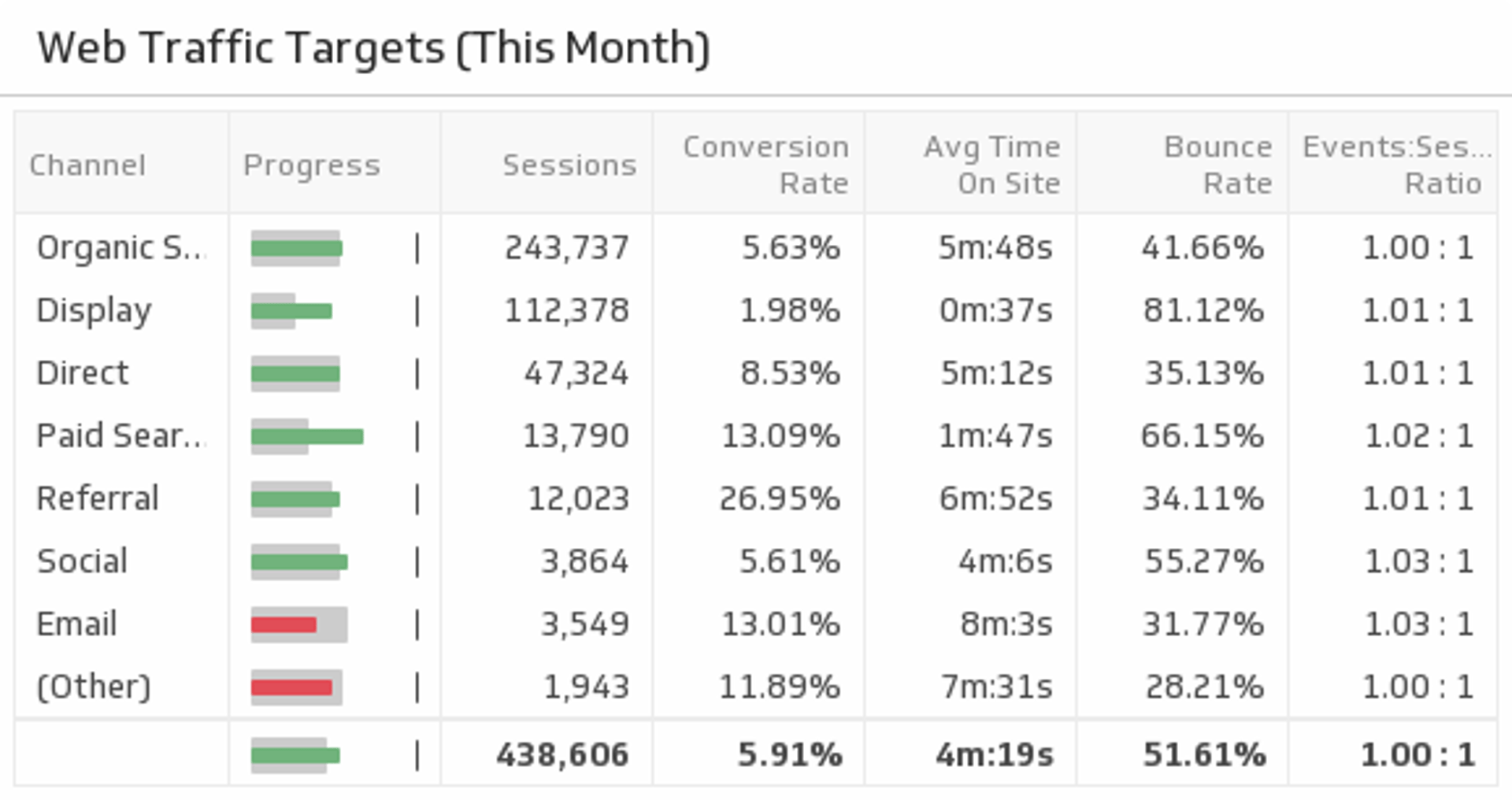
As this metric looks at all your team’s efforts and allows you to monitor areas of success and for improvement, it's perhaps the ultimate metric for a marketing manager who needs a glimpse at the big picture. Again, this is a great metric to pull up in a meeting with your team to start a productive discussion.
Traffic by Device
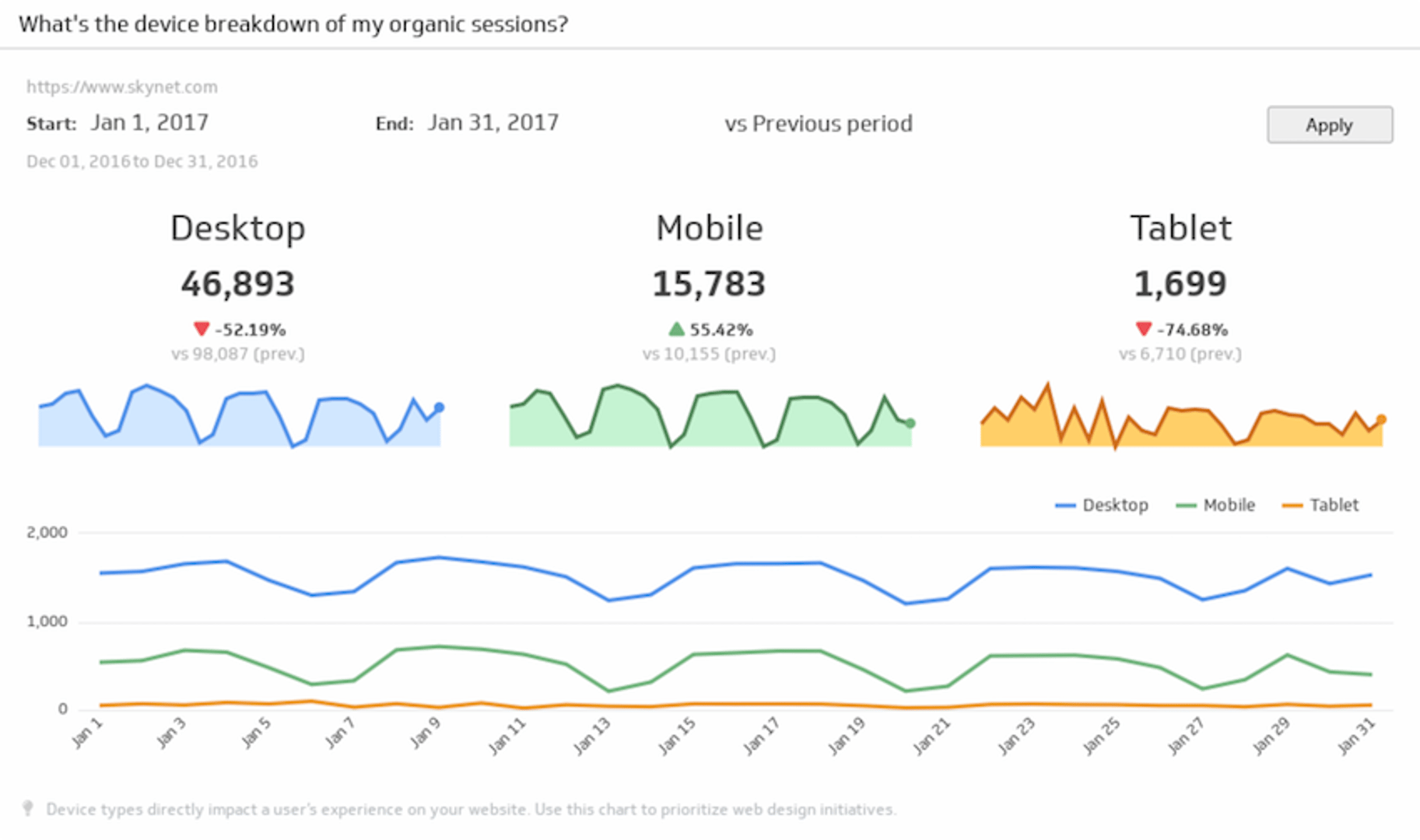
There's a good chance that your customer's journey is increasingly going mobile, which means your marketing strategy must follow your customer's lead. If you’re targeting a specific persona or demographic, monitoring this metric will give you a necessary overview that will help you direct your web design and product teams.
A final word on tracking your team's marketing metrics
One is the loneliest number.
The most important takeaway from this post is that you can’t just monitor one metric and understand your team’s performance. The beauty of marketing metrics is that they give you a deeper understanding of your team's efforts and capabilities, while allowing you to leverage insights into your existing and potential customers.
The most effective way to manage marketing performance is to make clear associations between the dots I mentioned earlier. This allows you to at once see the many moving parts while driving your team toward the larger goal. A great way to do this, and it's a way we've used diligently over the years, is to create marketing dashboards which can be designed and customized both for your specific needs as a marketing manager and for the needs of your various teams.
Lastly, monitoring performance is the job of your team as much as it is for you as a manager. Learn more about how Klipfolio can help you with its Facebook Analytics reporting tool. When you have metrics such as the ones above that make it easy for everyone to understand and evaluate direction, the energy you spend juggling is virtually cut in half. Utilizing the strengths of your team and identifying areas of improvement makes it easier for everyone to know what they need to focus on, and then to put their head down to do it.
Related Articles

The 5 most important SEO KPIs for digital marketing success
By Sanket Patel — February 24th, 2026
The Hidden Value of SaaS Sign Up Rate Benchmarks
By Priyaanka Arora — January 10th, 2026
Top 10 Marketing Dashboard Ideas for Tech Companies


